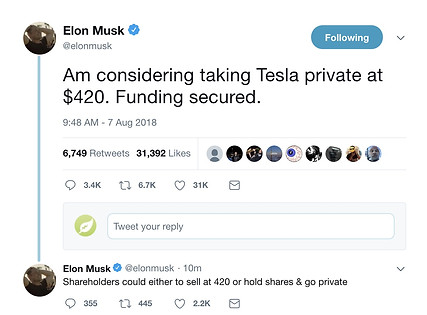
THE ELON MUSK PERSONA
How does Elon Musk capitalize on people's unconscious desires?
Known for posting regularly on Twitter, even announcing his plan to take Tesla private at "$420" a share on this platform, in addition to smoking pot during a live broadcast and berrating journalists, Elon Musk is not your average CEO. Recently, Musk’s erratic behavior has prompted much speculation regarding his overall mental state. The media has made Musk out to be a lunatic on the brink of a mental breakdown, but what if this is “lunacy” is what rocketed him to the top?

Musk's infamous tweet where he announced his plan to take Tesla private, without informing his investors beforehand.
Musk’s impulsivity may very well be the key to his success. Michael A. Freeman, a UCSF clinical psychiatrist that specializes in mental health among CEOs and entrepreneurs, stated that “entrepreneurs often have a temperament and a constellation of traits that can create enormous value but are also associated with significant risks.”
“Entrepreneurs generally have mental health profiles that are associated with higher levels of creativity, higher levels of energy, higher levels of risk tolerance and higher levels of impulsivity.”
Kara Swisher of the New York Times, has even applied Freudian theory to Musk’s success. According to Swisher, Musk is the “Id” of Silicon Valley and therefore is fully driven by instinct. Freud’s theory of personality describes the id as having “no comprehension of objective reality, and is selfish and wishful in nature.” Musk often displays his greatest desires on Twitter for the whole world to see and regularly acts on his absurd instincts.
Musk and Trump
Musk's erratic and unpredictable behavior resembles that of another influential businessman: Donald Trump. Although Musk and Trump obviously differ greatly in their respective fields, Musk has created an empire that seeks to combat the energy crisis and create a more sustainable future, while Trump denies that climate change even exists and refuses to sign international climate accords, their rise to power shares unmistakable similarities.

Both Trump and Musk have been successful in part, due to their ability to play off of people’s unconscious and narcissistic desires. The idea of creating loyalty among the masses by playing off of people's desires again relates to Freudian theory. Freud’s nephew and influential advertiser of the twentieth century, Edward Bernays, coined the idea that in order to manipulate and control the masses you need to appeal to their unconscious desires. Trump and Musk both do this: Trump by acknowledging the struggling American working class and promising to “Make America Great Again” and Musk by creating futuristic technology and appealing to the human desire of expanding into the unknown.
Check out Elon Musk’s Ted Talk to see how he specifically builds his consumer base by crafting an ambitious and innovative vision of the future.